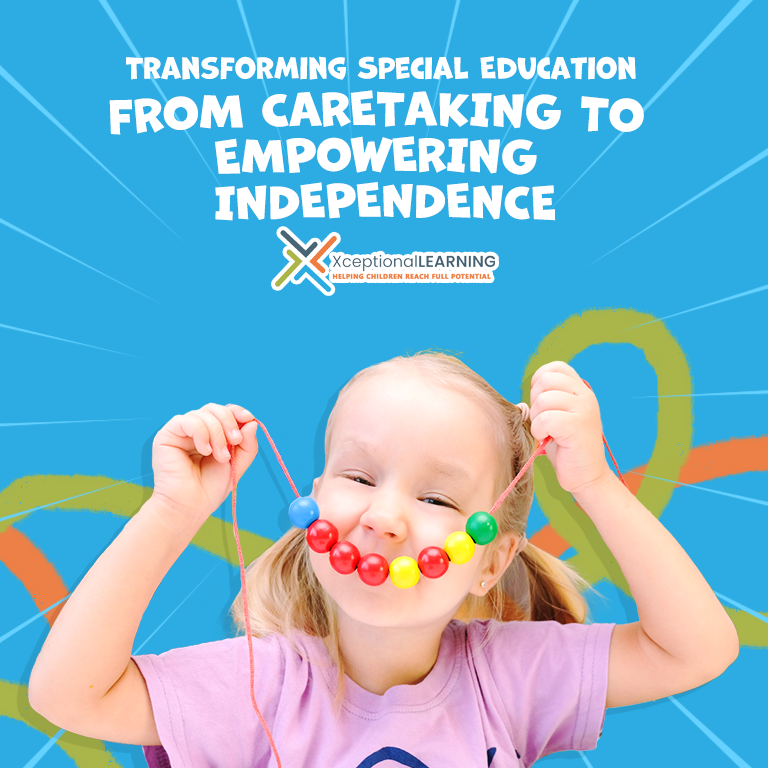Transformingô Specialô Education:ô Fromô Caretakingô to Empowering Independence
admin May 24th, 2024
– Clinically Reviewed by
Msc. Psychology, BEd in Special Education (ID)
Consultant Psychologist, Special Educator & Digital Therapy Trainer
Introduction:
Special education is a vital field aimed at providing tailored support to individuals with diverse learning needs. However, in some cases, the focus has shifted towards caretaking rather than fostering learning and independence. This scenario raises concerns about the quality of education and the development of life skills among special education students. This write-up delves into the current situation, proposes strategies to enhance the teaching approach, and suggests ways to educate parents about the significance of empowering their children’s independence.
Current Situation:
- Caretaker Role of Teachers
In certain instances, teachers in special education classrooms may inadvertently adopt a caretaker role, prioritizing physical well-being over cognitive and skill development. This may stem from a lack of proper training or understanding of effective teaching strategies.
- Parental Attitudes
Some parents may view schools as a respite from caregiving duties at home. Consequently, they might not actively seek educational growth for their children, content with the idea of them being occupied at school.
Improvement Strategies:
- Teacher Training and Professional Development:
Inclusive Pedagogies: Equip teachers with techniques that facilitate inclusive teaching, emphasizing student participation and engagement.
Adaptive Instruction: Provide training on tailoring teaching methods to suit individual learning styles and abilities.
Use technology: Technology can be a great tool for helping kids with disabilities learn. There are many apps and software programs that can be customized to meet the individual needs of each student.
- Curriculum Enhancement:
Life Skills Integration: Develop curricula that blend academic learning with practical life skills, enabling students to become more independent and self-reliant.
Project-Based Learning: Implement projects that encourage problem-solving, decision-making, and collaboration, fostering skills beyond rote learning.
- Individualized Education Plans (IEPs):
Personalized Goals: Craft IEPs that focus on each student’s strengths and needs, setting realistic academic and life skill goals.
Regular Assessment: Continuously assess progress and adjust strategies to meet evolving requirements.
- Parental Education:
Involve parents: Parents are the child’s first teachers. They need to be involved in the special education process. This includes things like attending IEP meetings, providing feedback to teachers, and helping their child with homework.
Workshops and Seminars: Organize workshops for parents to understand the significance of active involvement in their child’s education and life skill development.
Showcasing Progress: Regularly update parents on their child’s achievements, emphasizing not only academic milestones but also improvements in life skills.
- Community Involvement:
Collaboration with Local Organizations: Partner with community organizations that specialize in vocational training, internships, and other real-world experiences.
Exposure Trips: Arrange visits to workplaces, farms, or other settings where students can apply their skills in real-life situations.
Prioritize transition planning: Transition planning is essential for helping kids with disabilities prepare for life after high school. This includes things like helping them find a job, get into college, and live independently.
By making these changes, we can improve the quality of special education and give kids with disabilities the opportunity to reach their full potential.
Case Examples:
- Inclusive Teaching: A teacher uses visual aids, interactive games, and peer-assisted learning to engage all students, helping them grasp concepts and develop social skills simultaneously.
- Life Skills Curriculum: A special education school integrates cooking classes into their curriculum, teaching students math, safety, and independence while preparing simple meals.
- Parental Engagement: A school organizes regular open houses where parents observe classroom activities, encouraging them to take a keen interest in their child’s educational journey.
Here are some examples of how these changes have been implemented successfully:
- The Sarva Shiksha Abhiyan (SSA) is a government program that aims to provide free and compulsory education to all children in India, including children with disabilities. The SSA has helped to increase the enrollment of children with disabilities in schools, and has also provided them with access to assistive devices and other resources.
- The National Institute for the Mentally Handicapped (NIMH) is a government-run institution that provides training and support to teachers and other professionals who work with children with mental disabilities. The NIMH also conducts research on mental disabilities and develops educational programs for children with these disabilities.
- The Apeejay School in Mumbai is a private school that has a strong commitment to inclusive education. The school has a special education wing that caters to children with a variety of disabilities, including autism, cerebral palsy, and learning disabilities. The school also offers a number of extracurricular activities for its special education students, such as art, music, and sports.
- The Divyangjan Vikas Sanstha is a non-profit organization in Pune that works to improve the lives of children with disabilities. The organization provides a variety of services, including education, vocational training, and social support. The Divyangjan Vikas Sanstha also advocates for the rights of children with disabilities and works to create a more inclusive society.
These are just a few examples of how special education is being improved in India. There are many other organizations and individuals working to make a difference in the lives of children with disabilities. With continued effort, we can create a more inclusive society where all children have the opportunity to reach their full potential.
Conclusion:
Transforming special education from a caretaking model to an empowering and inclusive one requires concerted efforts from educators, parents, and the community. By focusing on teacher training, personalized learning, parental education, and community involvement, we can create an environment where special education students not only receive care but also gain essential life skills, grow academically, and develop into more independent individuals poised for a fulfilling future. XceptionalLEARNING offers individualized special education programs designed to meet each student’s unique needs, ensuring optimal learning outcomes and personal growth. Our platform offers personalized solutions to meet unique learning needs, ensuring each student excels. Contact us today for customized solutions and expert support in creating effective, individualized education plans.

